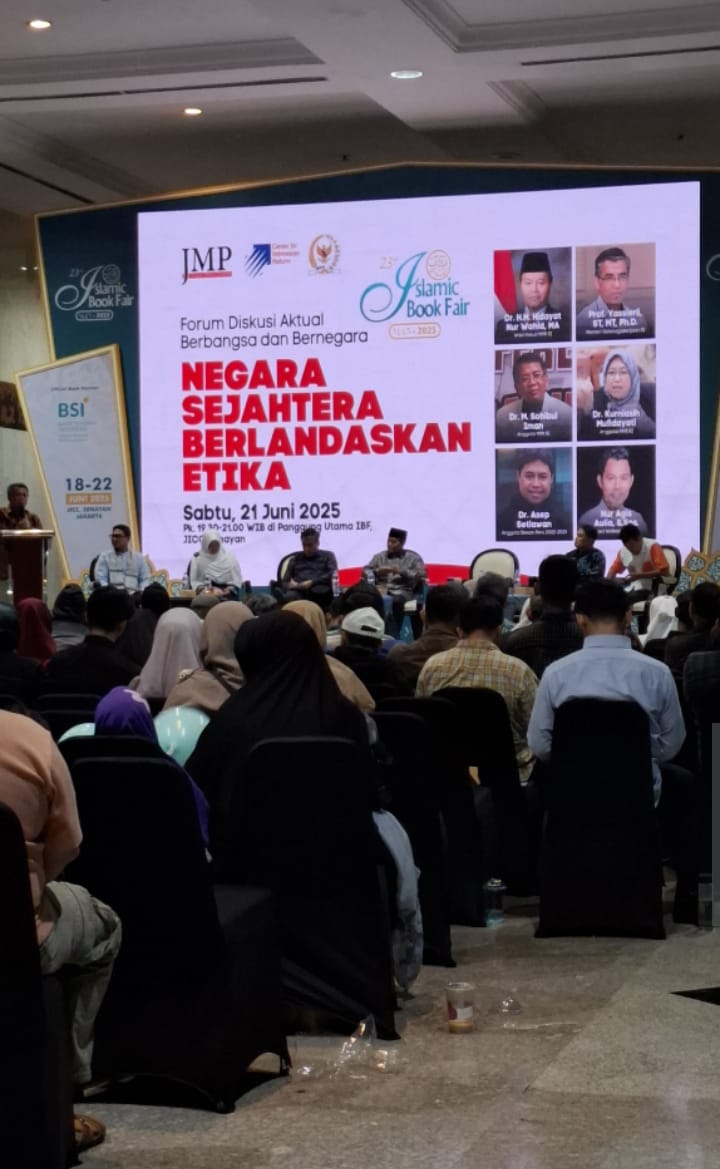Hidayat Nur Wahid, Deputy Chairman of the Indonesian People's Consultative Assembly, said the country, through its state ideology Pancasila, explicitly incorporates this concept in two principles: Just and Civilized Humanity, and Social Justice for All Indonesian People.
Jakarta (Indonesia Window) – Deputy Chairman of the
Indonesian People's Consultative Assembly (locally known as its abbreviation MPR RI) for the 2024-2029 period, Hidayat Nur Wahid, elaborated on his views regarding the state's obligation to ensure prosperity for its citizens, commonly referred to as the concept of a Welfare State.
“In this concept, the state must provide equal opportunities, equitable wealth distribution, and transparent public accountability,” Hidayat said in his speech at a discussion and the launch of his book A Prosperous State Grounded in Ethics over the weekend at the Islamic Book Fair 2025, Jakarta.
According to Hidayat Nur Wahid,
Indonesia, through its state ideology Pancasila, explicitly incorporates this concept in two principles: Just and Civilized Humanity, and Social Justice for All Indonesian People.
The opening section of the book, with a Foreword by Dr. (HC) H.M. Jusuf Kalla and an Introduction by Prof. Dr. Hamid Fahmy Zarkasyi, explores the importance of ethics in national and state life, and how ethics have, at times, been sidelined by power-driven attitudes that seem to control everything.
The subsequent section of this 506-page book discusses the concept and practical implementation of Indonesia as a welfare state through various forms of protection and policy alignment in favor of citizens.
The final section, published through a collaboration between SAGA, the Indonesia
Institute, and the Center for Indonesian Reform, examines Indonesia’s efforts to maintain an active and independent foreign policy on the international stage, particularly in supporting the establishment of Palestinian independence.
Hidayat further stated that, at the practical level, the public generally accepts various forms of social protection, ensuring their prosperity is maintained at a certain level and providing equal opportunities to strive for improved socio-economic status.
“The main principle is that we must not leave anyone far behind, or in the language of the Sustainable Development Goals (SDGs), often termed as leave no one behind,” he said.
The prosperity of citizens, as mandated by the 1945 Constitution of the Republic of Indonesia, must be reflected in the programs implemented by the government.
Pregnant or recently delivered mothers must be ensured a decent livelihood so they can provide the best for their children, the next generation of the nation.
Children who have lost their parents due to COVID-19 or other disasters must be cared for by the state through support for living expenses and access to education.
Additionally, citizens with varying abilities and limitations should be provided with assistive devices and access to economic resources suited to their skills. Even the vulnerable middle class, living close to the poverty line, needs access to social protection to prevent them from falling into poverty during economic shocks.
However, Hidayat noted that, in reality, the commitment to social protection in Indonesia fluctuates from year to year. The nation’s great task is not only to ensure prosperity for its citizens but also to ‘contribute to establishing a world order based on independence, lasting peace, and social justice’.
“This aspiration can only be achieved by a prosperous and fully sovereign nation. Thus, the nation’s development agenda must meticulously address the welfare state agenda that creates social justice, while simultaneously playing an active role on the international stage. These two agendas are not contradictory but instead reinforce Indonesia’s character as a prosperous and dignified nation.
Principle of Inclusivity
Minister of Manpower Prof. Yasserli stated that the principle of inclusivity—or ensuring no one is left behind—serves as the primary foundation for formulating national labor policies. This principle aligns with the characteristics of a welfare state.
“A concrete form of implementing this principle is the Ministry of Manpower’s
establishment of the Directorate for Disability Employment Placement. This directorate aims to expand job opportunities for persons with disabilities and ensure equal access in the workplace,” he said.
In addition to Minister Yasserli, Dr. M. Sohibul Iman and Dr. Kurniasih Mufidayati from the Indonesian House of Representatives (DPR RI), Nur Agis Aulia, Deputy Mayor of Serang (the capital of Indonesia’s Banten province), and Dr. Asep Setiawan (a member of the Press Council) provided their perspectives during the discussion and book launch.
Reporting by Indonesia Window



.jpg)
